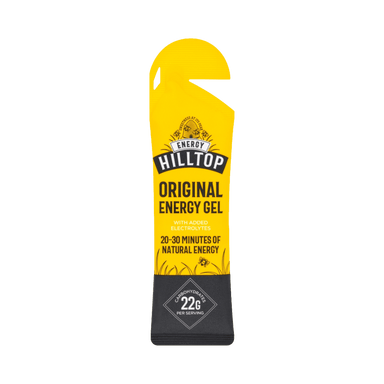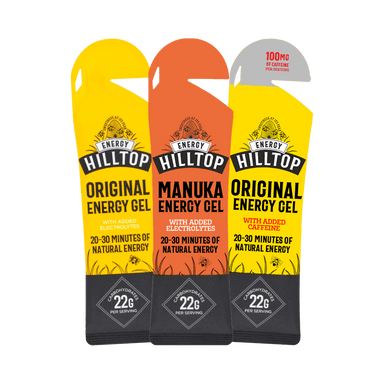

GO Energy + Elektrolytgel
Das SIS Original Isotonic GO Energy Gel mit zusätzlichen Elektrolyten ist ein leistungsstarkes Hilfsmittel zur Verbesserung der Flüssigkeitszufu...
Vollständige Details anzeigenJetzt Versand nach Frankreich mit FedEx
Jetzt Versand nach Belgien mit FedEx
Der maximale Bestellwert beträgt 150 €. Internationalen/EU-Versand anzeigen





Popular Brands
Popular Products
Popular Fuel Brands
Popular Fuel Products
Popular Hydration Brands
Popular Hydration Products

Sponsored
SLT+

Sponsored
Electrolytes

Sponsored
Electrolite-Tabletten

Sponsored
Kern 500

Sponsored
Hydrate Smart Electrolyte Drink

Sponsored
Ultra-Elektrolyte

Sponsored
TORQ Hydration Drink

Sponsored
Elektrolyt- und Kohlenhydrat-Getränkemischung

Sponsored
OTE Hydro Tabs

Sponsored
Unsweetened Hydration Sport Drink Mix
Popular Recovery Brands
Popular Recovery Products
Popular Health Brands
Popular Health Products
Popular Ausrüstung & Technik Brands
Popular Ausrüstung & Technik Products
Popular Trendangebote Brands
Popular Trendangebote Products

Sponsored
truefuels Herbst-Trainingspaket

Sponsored
Kostenloser Belt Pro

Sponsored
GO Isotonic Energy Gel Variety Pack

Sponsored
Sport-Stirnband

Sponsored
INFINIT Starterpaket

Sponsored
STYRKR Probierset

Sponsored
Ooriginal Sport Erholungssandalen

Sponsored
Propel Neopren-Badekappe

Sponsored
PILLAR 7-Tage-Probepackung

Sponsored
Die Run Compression Tall-Socken
Tauchen Sie ein in eine Welt endloser Energiemöglichkeiten mit unserem breiten Sortiment an Schwimm-Energiegelen in verschiedenen Formen, Geschmacksrichtungen und Größen. Unsere Energiegele wurden entwickelt, um Ihre leeren Kohlenhydratspeicher bei intensiven Trainingseinheiten, Wettkämpfen oder wann immer Sie einen zusätzlichen Energieschub benötigen, wieder aufzufüllen und Ihre Leistung zu steigern.
Die beste Möglichkeit, während des Trainings voller Energie zu bleiben, ist die Einnahme eines Energiegels, einer hervorragenden Kohlenhydratquelle.
Unabhängig von der Distanz ist es wichtig zu verstehen, wie Energiegele mit Ihrem Körper interagieren.
Energiegele sind zu einer beliebten Wahl geworden, da sie eine schnelle und bequeme Energiequelle zur Aufrechterhaltung der Leistungsfähigkeit bieten.
Die wohl bequemste und effektivste Art, Ihren Körper bei langen Schwimmeinheiten oder Wettkämpfen mit Energie zu versorgen, sind Energiegele. Egal, ob Sie für einen 5-km-Freiwasserschwimmen oder einen Ironman-Triathlon trainieren: Es ist entscheidend zu verstehen, wie Energiegele mit Ihrem Körper interagieren und wann und wie Sie sie für maximale Leistungsvorteile einsetzen.
Ihr Körper nutzt Fett und Kohlenhydrate als Energiequellen. Fett ist zwar vorhanden, wird aber langsamer in nutzbare Energie umgewandelt, was das Schwimmen über einen längeren Zeitraum von 1–2 Stunden weniger effektiv macht.
Das bedeutet, dass Ihr Körper in erster Linie auf Kohlenhydrate als Energieträger angewiesen ist. Allerdings kann Ihr Körper nur eine begrenzte Menge an Kohlenhydraten, das sogenannte Glykogen, in den Muskeln speichern.
Wenn Sie beispielsweise im Wettkampftempo schwimmen, verbrauchen Sie Ihre Glykogenspeicher nach etwa 90 Minuten. Bei längeren Ausdauerschwimmen dauert es etwa 120 Minuten (2 Stunden), bis Sie zusätzlichen Energiebedarf haben. Hier sind die wichtigsten Fakten, um zu verstehen, wann und warum Sie mit der Energiezufuhr beginnen müssen.
Energiegele liefern einfachen Zucker, der schnell als Glukose in den Blutkreislauf aufgenommen wird und Ihnen einen Energieschub gibt. Diese Glukose wird dann von Ihren aktiven Muskeln aufgenommen.
Jedes Gel liefert 15–45 Minuten Energie mit etwa 25 g Kohlenhydraten in Form von Einfachzuckern, einer für Ihren Körper leicht zu verarbeitenden Energiequelle.
Es geht jedoch nicht nur um die Kohlenhydrate. Je nach Energie-Gel sind noch weitere Zutaten enthalten, die deine Leistungsfähigkeit steigern:
KOFFEIN – Kann die Wachsamkeit, Konzentration, Reaktionszeit und die Fähigkeit, länger härter zu trainieren, verbessern, indem es die Wahrnehmung der Anstrengung verringert.
NATRIUM (ELEKTROLYTE) – Natriummangel kann zu Muskelkrämpfen, Hitzeerkrankungen, einer unzureichenden Rehydrierung und einem erhöhten Risiko für Hyponatriämie führen.
AMINOSÄUREN (BCAAs) – Aminosäuren sind die Bausteine der Muskeln. Ein niedriger Gehalt an verzweigtkettigen Aminosäuren (BCAAs) kann durch einen Prozess namens „zentrale Ermüdung“ zu Müdigkeit oder dem Gefühl von Müdigkeit beitragen.
Hinweis: Da Koffein ein Stimulans ist, sollten Sie abwechselnd koffeinhaltige und koffeinfreie Gele einnehmen, um sicherzustellen, dass Sie nicht zu viel davon zu sich nehmen.
Die richtige Energiezufuhr ist entscheidend. Warten Sie nicht, bis Sie Energie brauchen, denn dann ist es zu spät. Das ist der Hauptgrund, warum viele Menschen sagen, sie seien „zusammengebrochen“ oder „gegen die Wand gefahren“. Der ideale Zeitpunkt für die Einnahme eines Energiegels hängt von Ihnen und Ihrem Körper ab.
Normalerweise geht man davon aus, dass man die Wirkung eines Energiegels etwa 15 Minuten nach der Einnahme spürt.
Die doppelte Einnahme ist nicht die Lösung. Wenn Sie zwei auf einmal einnehmen, erhalten Sie nicht den doppelten Energieschub. Stattdessen wird Ihr Körper wahrscheinlich zusammenbrechen, während er versucht, den Zucker zu verarbeiten.
Für Schwimmer bei längeren Freiwasserrennen oder Pool-Events ist dies beispielsweise eine nützliche Anleitung zur Einnahme eines Energiegels mit einem 45-Minuten-Verbrauchsgel:
5 km Freiwasserschwimmen (2 Gels)
- 15 Minuten vor Beginn
- Halbzeit
10 km Freiwasserschwimmen (4 Gels)
- 15 Minuten vor Beginn
- Alle 45 Minuten während des Schwimmens
Sie sollten etwa alle 45–60 Minuten zwischen den Gel-Einnahmen Energie über Gels aufnehmen und dabei darauf achten, Ihren Magen nicht mit zu viel Einfachzucker auf einmal zu überlasten.
WARNUNG – Die Anleitungen basieren auf der Annahme, dass die Gele alle 45 Minuten eingenommen werden müssen .
Achten Sie bei Energiegelen immer auf die Verzehrangaben auf der Verpackung.
Manche Marken empfehlen die Einnahme eines Energiegels alle 15–20 Minuten (drei pro Stunde), andere sind für die Einnahme alle 45 Minuten ausgelegt. Überlegen Sie einmal: Würden Sie während eines 10-km-Schwimmens wirklich mehr als zwölf Energiegele zu sich nehmen? Oder wären vier von unterschiedlichen Marken besser? Das große Problem ist, wenn jemand unterernährt ist – ein Energiegel ist nicht immer gleich ein Energiegel.
Dies ist eine häufig gestellte Frage, und jeder hat einen anderen Geschmack. Obwohl Gele in der Regel auf Wasserbasis hergestellt werden, variiert ihre Konsistenz von zäh und dick bis hin zu einer getränkeähnlichen Konsistenz mit unterschiedlichen Geschmacksstärken.
Bei der großen Auswahl an Geschmacksrichtungen auf dem Markt – von Zitrusfrüchten bis hin zu dekadenten Dessertaromen oder Ihrem Lieblingskaffee – können Sie wirklich etwas herausfinden, indem Sie ein paar verschiedene Marken testen, um herauszufinden, welche Konsistenz und welcher Geschmack Ihnen am besten schmecken.
Üben, üben, üben. Wie bei jeder Ernährung möchten Sie sicherstellen, dass Sie lange vor dem Renntag über eine bewährte Methode verfügen, um die benötigte Energie zu sich zu nehmen. Das ist bei Energiegels nicht anders.
Im Laufe Ihres Trainings steigern Sie Ihre Distanz und Distanz. Am besten testen Sie Produkte während langer Schwimmeinheiten, um herauszufinden, wann und welche Energiegels für Sie am besten geeignet sind.
Es ist immer am besten, Energiegels mit Wasser einzunehmen, bei manchen Energiegels ist dies jedoch nicht notwendig.
Ohne Wasser dauert es länger, bis manche Energiegele verdaut werden und in den Blutkreislauf gelangen, was zu Leistungsverzögerungen führt. Nehmen Sie Energiegele außerdem nicht zusammen mit einem Sportgetränk ein, es sei denn, Sie konsumieren sie im Rahmen einer geplanten Einnahme. Die kombinierte Einnahme von Energiegelen und einem Energiegetränk birgt das Risiko, zu viel Zucker auf einmal zu sich zu nehmen.
Energiegele und Energiekaugummis sind bei Schwimmern beliebt, die eine schnelle und praktische Kohlenhydratquelle zur Steigerung von Energie und Ausdauer suchen. Beide Produkte haben ihre Vor- und Nachteile. Die Wahl des richtigen Produkts hängt von Ihren persönlichen Vorlieben und Bedürfnissen ab.
Energiegele bieten eine schnelle und einfache Möglichkeit, Kohlenhydrate und Elektrolyte zu sich zu nehmen, sind aber möglicherweise nicht für Personen geeignet, denen die Konsistenz oder der Geschmack nicht gefallen.
Energiekaugummis hingegen bieten einen ansprechenderen Geschmack und eine ansprechendere Konsistenz, benötigen jedoch möglicherweise länger zum Verzehr und sind möglicherweise nicht für Personen mit Ernährungseinschränkungen geeignet.
Um die beste Option für Sie zu finden, ist es wichtig, Ihre Erfahrungen mit verschiedenen Produkten zu dokumentieren, zu notieren, was funktioniert und was nicht, und bei Bedarf Anpassungen vorzunehmen.

 Multi-Pack Deals
Multi-Pack Deals
Das SIS Original Isotonic GO Energy Gel mit zusätzlichen Elektrolyten ist ein leistungsstarkes Hilfsmittel zur Verbesserung der Flüssigkeitszufu...
Vollständige Details anzeigen


 Ausverkauft
Ausverkauft



